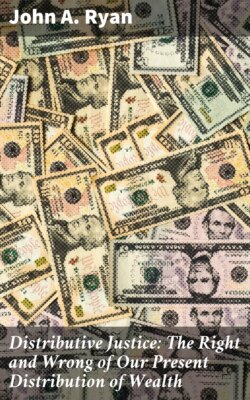Читать книгу Distributive Justice: The Right and Wrong of Our Present Distribution of Wealth - John A. Ryan - Страница 15
На сайте Литреса книга снята с продажи.
Conclusions from History
ОглавлениеTable of Contents
What conclusions does history warrant concerning the social and moral value of private landownership? Here we are on very uncertain ground; for different inferences may be drawn from the same group of facts if a different section of them be selected for emphasis. Sir Henry Maine and Henry George both accepted the theory of primitive agrarian communism, but the former saw in this assumed fact a proof that common ownership was suited only to the needs of rude and undeveloped peoples, while the latter regarded it as a sure indication that common ownership was fundamentally natural and in accordance with permanent social welfare. The fact that practically all peoples whose history we know discarded communal for private ownership as soon as they had acquired a moderate degree of proficiency in methods of cultivation and in the arts of civilised life does, indeed, create a presumption that the latter system is the better for civilised men. To this extent Sir Henry Maine is right. Against this presumption Henry George maintained that common ownership was abandoned solely because of the usurpation, fraud, and force employed by the powerful and privileged classes. Undoubtedly this factor played a great part in bringing about the private ownership that has existed and still exists, but it does not account for the institution as a whole and everywhere. If chiefs, kings, and other powerful personages had never usurped control of the land, if no people had ever conquered the territory of another, it is probable that private ownership would have taken place to the same extent, although it would have been much more widely diffused. For the system of periodical repartition of land, to say nothing of communal cultivation and communal distribution of the product, does hinder that attachment to a particular portion of the soil and that intensive cultivation which are so necessary to the best interests of the cultivator, the most productive use of the land, and therefore the welfare of society.
On the other hand, the limitations on the right of private ownership which have been established in so many places and times in favour of those who were not owners, show that men have very generally looked upon land as in some measure the inheritance of all the people. Hence arises the presumption that this conviction is but the reflection of fundamental and permanent human needs.
Summing up the matter, we may say that the history of land tenure points on the whole to the conclusion that private ownership is socially and individually preferable to agrarian communism, but that it should be somewhat strictly limited in the interest of the non-owners, and of the community as a whole.
